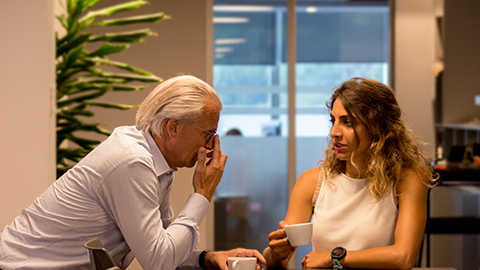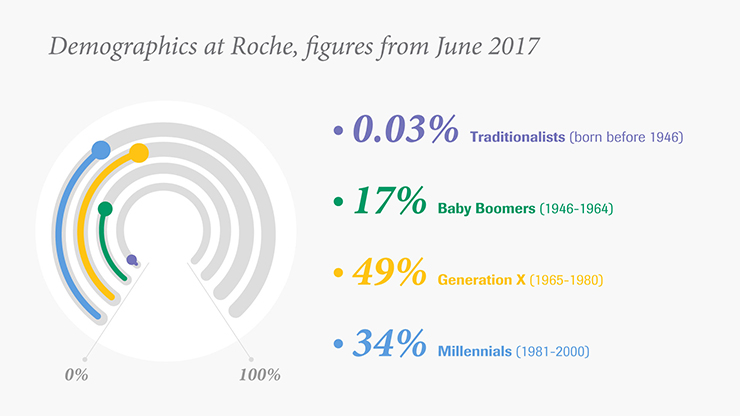
Reverse mentoring: it’s a two-way street
Özge Uzun is aged just 26. She is tech-savvy and a whizz with social media. When she joined Roche Pharma Turkey in the training centre just two years ago, it was her first job. Since then, she has already risen through the ranks to become an assistant to the General Manager. But as well as being the boss’s assistant, she’s also his teacher.
“It has been a very unique experience for me and I recommend it to all my peers. Most importantly I had the chance to understand him better - the way he thinks, the way he perceives my generation,” Özge explains.
It’s not everyday you get to tell the boss what to do, after all, there is an old adage that with age comes wisdom. But that wisdom only comes if someone continues to learn throughout their life. This could not be more relevant now, in a world that is changing fast.
The intergenerational workforce
By 2020, half the global workforce will be made up of Millennials – or Generation Y – who are already on their way to becoming a majority. According to the World Health Organisation, if a person remains fit and healthy at 60, they will be physically capable of working until they are 74-77 years old.
Employers now face not only a generation gap, but a massive demographic shift, with people living – and working – longer than ever before, a trend set to continue in the coming decades. This is the brave new world of the intergenerational workforce – where five generations could soon be working side-by-side. Some junior staff will not only be working alongside their grandparent’s generation, but their great grandparents’ too. With each group working and communicating in their own way – the challenges are obvious.
One very 21st century concept – reverse mentoring - is increasingly blazing a trail through big business to address this very issue – how to meld the generations for continued success. Reverse mentoring turns traditional mentoring – where a seasoned executive shows a younger and often less experienced colleagues the business ropes –completely on its head.
Now, senior workers are increasingly turning to – and learning from - their younger colleagues to gain a different perspective and valuable insight into new social media and technology trends and how they can be used effectively. This is making Millennials the must-have mentors for companies wanting to stay ahead.
Rethinking mindsets

Roche Pharma Turkey General Manager Adriano Treve, who has been with Roche Pharma for over 30 years, has been mentored by Özge for the past 10 months. He says: “It was not only about new technologies, but actually more about building bridges and understanding how the younger generation ticks, what they value and what they look for in their job.”
“All of them are ambitious and want to grow fast, if possible being considered as a GM candidate after 6 months!”
“They are full of energy and thirst for action, and being patient is definitely not one of their strengths. It was eye-opening to understand how clear and structured they are, despite their continuous exposure to the digital world. It is also quite rewarding to see the ‘fire’ in their eyes and the energy they transmit. The mentoring process with someone of the ‘younger’ generation is a great experience. I gained insights into the thinking process and how they handle and approach daily issues.”
“They are, despite all the technology around them, quite focused, dynamic and driven by action. The most important fact however is that they want to feel valued and that they can contribute. It has definitely been a rewarding relationship and I can highly recommend it to others as well.”
But reverse mentoring isn’t just about the oldies learning how to Tweet. It is so much more than that - closing the knowledge gap for both groups. Seniors are coached and guided about how the younger talent work and what they want, shaping the workplace into one which reflects the needs of their generation. In return, those new on the career ladder gain valuable insight into core business strategy and how things work from the top down. It is about the generations learning each others’ social behaviours and backgrounds, rethinking mindsets and growing personally and professionally.
Özge says: “People are saying that we as the Y generation are impatient. This was a good opportunity for me to show him my reasons and values. It takes time as well as willingness, trust and transparency. When you realise you have all these, you see that all barriers disappear. It is a way to close the knowledge gap for both parties. It is helpful, since I understand the way they think and the reasons behind their decisions. But this does not mean that we as the young generation will not challenge them.”
Reverse mentoring presents a major cultural shift but its benefits to an organisation are clear. It builds business resilience, boosts reputation and minimises retention issues by bringing together the diverse employee generations.
Reverse mentoring presents a major cultural shift but its benefits to an organisation are clear. It builds business resilience, boosts reputation and minimises retention issues by bringing together the diverse employee generations.
Senior bosses who show they are willing to hear about and even adopt fresh, innovative ideas from a different perspective empower younger colleagues to openly share their views, making them feel more valued. And importantly for a pharmaceutical company, gleaning that invaluable insight about the generations coming behind could also help the leaders of today shape new medical innovations.
Babyboomers rose the ranks of a hierarchical workplace with an individualistic outlook being told what to do. But with many of these post-war babies now in their 60s, the management of this older workforce will introduce new opportunities – and challenges – for employers. Healthcare provision and productivity issues will come into play alongside the need for older workers to adapt.

Tapping into talent
Simona Starzynski, a HR specialist for Diversity & Inclusion at Roche, said: “We need to be proactive in finding flexible work models that will address the diverse needs of employees of different generations and facilitate greater sharing of knowledge. Our goal is to make the best use of our talent at every age.” Over the next ten years, around a quarter of employees at the Roche headquarters in Basel and Kaiseraugst site will retire – and they will take their knowledge and experience with them.
It’s “Age Project”, launched in 2015 at the site, is looking specifically at the needs of older employees. In 2018 those aged 60 and over will be able to choose to reduce their working hours while maintaining their previous insured salary for retirement.
In April 2016, Roche also launched “Working beyond 65,” giving employees the option to work until 70.A pool of retired employees is also being organised who return to Roche on a temporary basis to work on specific projects. New Perspectives aims to promote and encourage employee development at all ages.
Bruno Weissen, head of HR Basel/Kaiseraugst, said: “The aim is to cater to the various generations here at Roche. We want to offer all employees good opportunities to learn and work within the company over the long term. Flexibility and individual professional development are essential, irrespective of an employee's age or stage of life. That is what we are focusing on.
Empowering gen-Y
Other initiatives are mixing different generations at Roche. At Roche France, a "Millennials Community” initiative, is embracing the digital era across generations. It has seen 45 Millennial workers help older colleagues with digital literacy, implementing new more agile ways of working.
This has increased employee knowledge about digital trends and fostered dialogue between generations.
Project Leader Pascal Ray, said: “The Millennials Community provides Roche employees from the ‘Y-Generation’ the opportunity to have an impact on the company’s culture and boosts their sense of empowerment..and makes sure that digital is perceived not as a threat but really as a vector of opportunities, innovation and fun.”
Bjoern Lamprecht, 37, a Market Access manager for Roche in Grenzach, Germany, who is involved in the reverse mentoring programme, said: “My mentee was older than me and helped me learn how they adapt to some new technologies that are more natural for my generation.”
“But reverse mentoring for me isn’t just about age or technology it is also about bridging the gap between senior and lower management levels and even bringing different departments closer together,” Lamprecht said. Reverse mentoring is already building bridges between generations in the workforce giving the bosses of today invaluable new perspectives and giving the bosses of tomorrow a unique glimpse at what life is like at the top.



